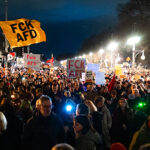Spy fiction is, above all, a family affair. This crucial but frequently overlooked reality feels especially important for understanding Karla’s Choice, the new novel about George Smiley and the Circus (the British Overseas Intelligence Service) written by one of John le Carré’s sons, Nick Harkaway.
The novel opens with a beautiful young man dancing and singing, beer in hand, on a refectory table. Karla’s Choice is the story of Susanna, a Hungarian émigré to Britain who is pulled into the secret world of the Circus when someone tries to kill her boss, the London-based publisher who she knows as Bánáti. Susanna’s own past, to include her resourcefulness, unfurls along with the not at all surprising, but still vastly compelling, revelation that Bánáti is a spy named Róka.
Róka is now on the run in an effort to save his only son — that dancing young man, Léo. Control — the head of the Circus — is as ruthless as ever, putting him at odds with Smiley. Within the world of le Carré’s novels the setting in 1963 is hugely significant — between the death of Alec Leamas and Liz Gold at the Berlin Wall at the end of The Spy Who Came in From the Cold and the disclosure of Bill Haydon’s traitorousness in Tinker, Tailor, Soldier, Spy. That a son continues the genre-defining narratives begun by his father about a father’s search for his son is — to put it mildly — more than a little overdetermined.
I want to bring a lot of overlapping meanings to “family affair.” Nick Dames notes that spy fiction is “the literature of Father’s Day gifts,” but I want to look beyond fathers and sons while not losing sight of them.
Contours of the Human Heart
Stories of espionage trace the contours of the human heart as they explore high-stakes questions of loyalty and betrayal against a geopolitical backdrop. Certainly they can take romantic love, usually but not inevitably illicit, as their subject. But in the main spy stories explore the inner-workings of marriage, domestic, and family life; forbidden relationships aren’t detailed for their own sakes, but for how they torque the household.
With respect to le Carré himself so much of the discussion since his death in 2020 has been about his own affairs. Smiley, fiction’s most famous spy and cuckolded husband, stays faithful to the faithless Ann. Meanwhile, Ann’s entanglements are often gestured towards, but never fully realized. Though in Ann’s view it’s Smiley himself who lacks fidelity because he saves for the Circus the affection that should be hers.
Family relations shape and are shaped by the family’s relationships to intelligence work and the intelligence services. The dynamics between parents, parents and kids, different families, and how a family is situated within a community are all the stuff of spy stories.
Some are more forthright about this than others: le Carré’s A Perfect Spy, the tale of what happens when a double agent goes missing after the death of his dad, is explicitly about its main character’s complicated relationship to his conman father, which echoes the author’s own complicated relationship to his conman father.
The everyday stuff of everyday life is central to spy fiction. Bureaucratic intricacies and details may round it out and the geopolitical stakes may always seem high, but at its heart is the look and feel of ordinary life. “Sometimes the whole of marriage was a coverstory” muses one character at the end of Silverview, which nicely captures the complicated interweavings between the open and secret worlds I’m tracing.
Everydayness
Novels, of course, are the literary form most associated with the humdrum of the usual. So by insisting on the domestic preoccupations of the spy novel, I realize that I am coming down fairly hard on the side of the novel and perhaps weighing the “spy” part less heavily than it deserves.
To me, it seems like the everydayness of spy fiction is being played up both inside the genre itself and even outside of it.
In this, though, I am following some of what I see as current trends in novels of espionage. To me, it seems like the everydayness of spy fiction is being played up both inside the genre itself and even outside of it. I am less convinced than others that “No genre is more masculine than the spy story, more impervious to feminist revisions.”
Emily Henry is an immensely popular writer whose novels end happily ever after; her recent Beach Read features a book club made up of women over 50 devoted to spy fiction with the delightful name of “Red, White Russian, and Blue Book Club.” This feels less like a leading indicator than it does a signal that spy fiction has come home, if not in from the cold. Lauren Wilkinson tells the story of Marie Mitchell in American Spy as a mother’s letter to her twin sons, her intelligence work as a Black woman demands that she seduce Thomas Sankara, the popular leader of Burkina Faso. Wilkinson opens with Marie stepping on a Lego Duplo in the middle of the night as her past revisits her in tangible, dangerous ways. A suburban living room, it seems, is a likely, if not the most likely, place to launch a thriller.
“The Niceties of Hungarian Womanhood”
Karla’s Choice enters into these dynamics in ways all its own. To help Róka find his son, Susanna tutors Tom Lake of the Circus’s “Scalpel” section—basically Control’s own men—in how to approach Léo’s mother, Iren: “In the space of forty intense minutes she coached Lake in the niceties of Hungarian womanhood as she understood it through memories of her mother, and insisted on a direct frankness that was quite at odds with Smiley’s inclination and Lake’s rough-hewn chivalry.”
The coaching of Lake is all for nought because Susanna, as a Hungarian woman, has already decided to make the approach herself, a decision she does not share with Lake or Smiley; her interactions with them are “just performance.” The pretense goes all the way down, fueled by maternal relationships. Susanna may not intend to let Lake get close to Iren, but their interactions dramatize that spy fiction insists that an operation rises or falls on how well they perform the look and feel of the everyday, the textures of which are learned through family relationships.
Le Carré took the action of his novels right up to the very last word on the very last page as evidenced by Leamas at the Berlin Wall, the big black Mercs swerving onto the bank forecourt in A Most Wanted Man, the exploding plane that caps off Our Kind of Traitor, to name just a few examples.
Spy vs. Spy, Family vs. Family
Reviews of Karla’s Choice complain that Smiley literally takes the wheel in the final pages of the novel. But this, to me, misses the point of the final pages. Smiley, as ever, is trying to take down the temperature as it threatens to dangerously spike. Karla, the Soviet spymaster and Control’s counterpart, will have none of it. Neither really, though, will Control. Spy against spy is fair game, but family against family is not, at least for Smiley. There is a limit of the traffic between the open and secret worlds:
Karla could be damaged, yes, even made vulnerable, but hardly toppled, and in making the attempt Control would overplay his hand and risk a declaration that families of intelligence officers in general were now legitimate targets. From there, the escalation was obvious and had no ceiling.
For Leamas and for his sins, Smiley wanted to do better.
Special Kind of Fidelity
Spy fiction demands a special kind of fidelity. Kingsley Amis is famous for, among other things, saying that even Ian Fleming “bolted down in some sort of reality” the details of James Bond and his adventures; Virginia Heffernan memorably quipped that “Realism doesn’t matter much in spy thrillers but for extra relatable suspense the spies should definitely spend more time looking for chargers.”
For my part, the bolt isn’t so much those chargers — though they may have roles to play! — but the more general point that the chargers illustrate: the absolute centrality of the everyday stuff of our ordinary daily rounds to stories of espionage.
So it is that Karla’s Choice ends with Ann and Smiley talking about his work, which is also a discussion about their marriage, or is it a talk about their marriage which is also a discussion of his work. In either event, it seems like more stories of the Circus may be in the offing, or maybe the final line is simply a reference to the in-between times setting of this particular Smiley novel: “She sighed, then patted his hand. ‘Oh George. You have one more thing you need to do.’”





















